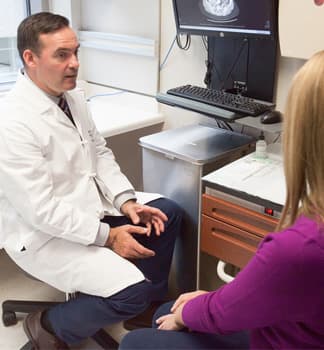For Patients

Ovarian cancer is the fifth leading cause of cancer death in women.
It’s estimated that 21,410 women in the U.S. will be newly diagnosed with ovarian, fallopian tube, or primary peritoneal cancer in 2021, and 13,770 will die of it.
Although there have been slight improvements in progression-free survival after surgery and chemotherapy, survival rates remain poor for women with advanced ovarian cancer. Lack of progress in the treatment of ovarian cancer has been linked to three main problems:
- Later stage at diagnosis: Ovarian cancer is usually detected later than most other types of solid tumors. Approximately 57 percent of ovarian cancer patients receive their diagnosis when the disease has already spread to distant sites in the body. Women with distant metastasis at diagnosis have a five-year survival rate of only 30 percent. In contrast, women whose disease is caught early, when it’s confined to the primary site, have a five-year survival rate of almost 93 percent; unfortunately, however, only 16 percent of women are diagnosed at this early, most treatable stage.
- Resistance to chemotherapy: In the beginning, most patients with advanced disease will respond to certain types of chemotherapy (platinum- and paclitaxel-based), but eventually, the disease tends to become resistant to chemotherapy, returning in about 70 percent of women with ovarian cancer. Tumors usually reappear within two years of surgery and chemotherapy. Once that happens, a cure is very unlikely.
- Limited effectiveness of immunotherapy: Though immunotherapies such as immune checkpoint blockade, adoptive T cell therapy, and oncolytic viruses have led to remarkable advances in the treatment of other tumor types (e.g. melanoma, lung, and kidney cancer), these strategies have been less successful in ovarian cancer. Studies by researchers at Roswell Park, the University of Chicago, and others have identified critical factors which make immunotherapy less effective in ovarian cancer than other cancers.
To help women with ovarian cancer survive longer, the Roswell Park-University of Chicago Ovarian Cancer SPORE will focus on:
- New ways to harness the patient’s own immune system to increase the effectiveness of treatments given after the patient is newly diagnosed or after the disease has returned.
- Identification of immune-system pathways that predict how patients will probably respond to different therapies, making it possible to better match patients to treatments that will work best for them.
- New ways to treat the immune resistance mechanisms inherent to recurrent ovarian cancer through innovative viral and dendritic cell oncotherapy clinical trials
The Roswell Park-University of Chicago Ovarian Cancer SPORE exists to improve the treatment of ovarian cancer through a highly coordinated, collaborative infrastructure that includes individual translational research projects, supportive cores, and programs, including developmental research and career development.

Ovarian Cancer Care
UChicago Medicine gynecologic oncologists provide the full range of advanced diagnostic and treatment options for ovarian cancer, including access to new therapies available via clinical trials.
Learn about our ovarian cancer care